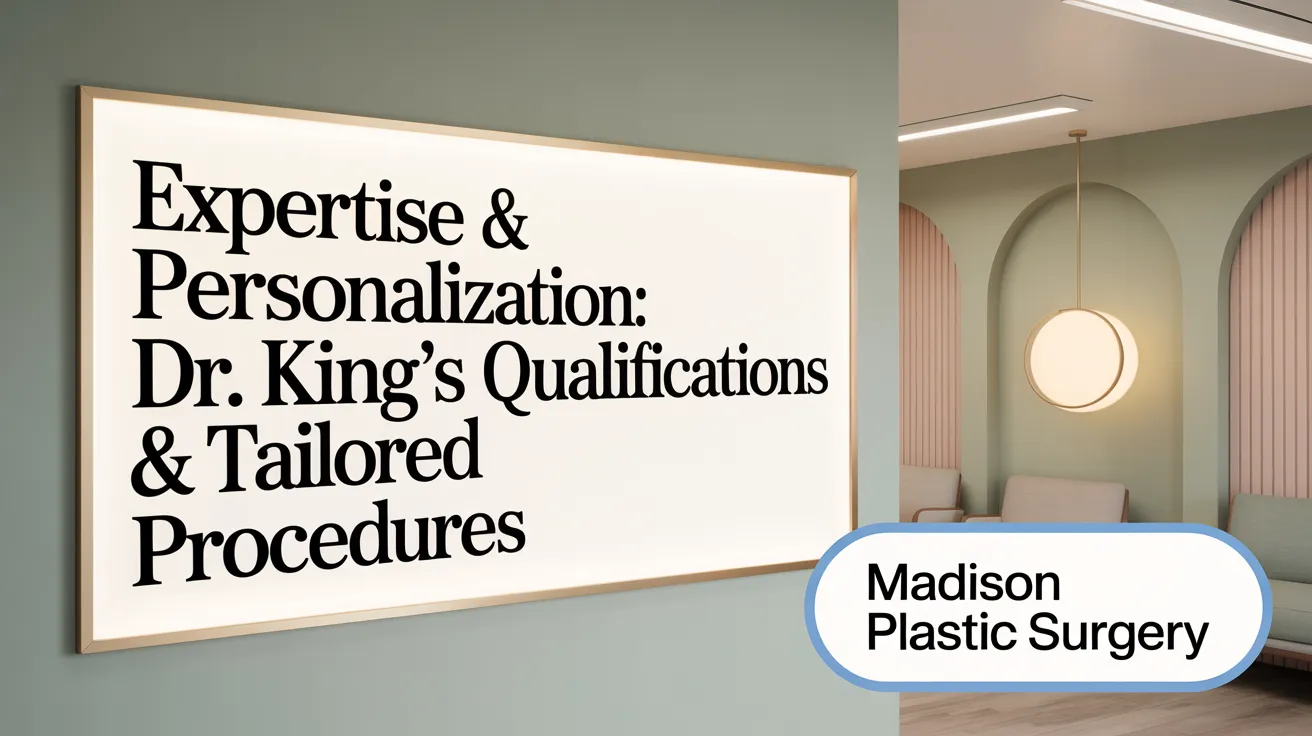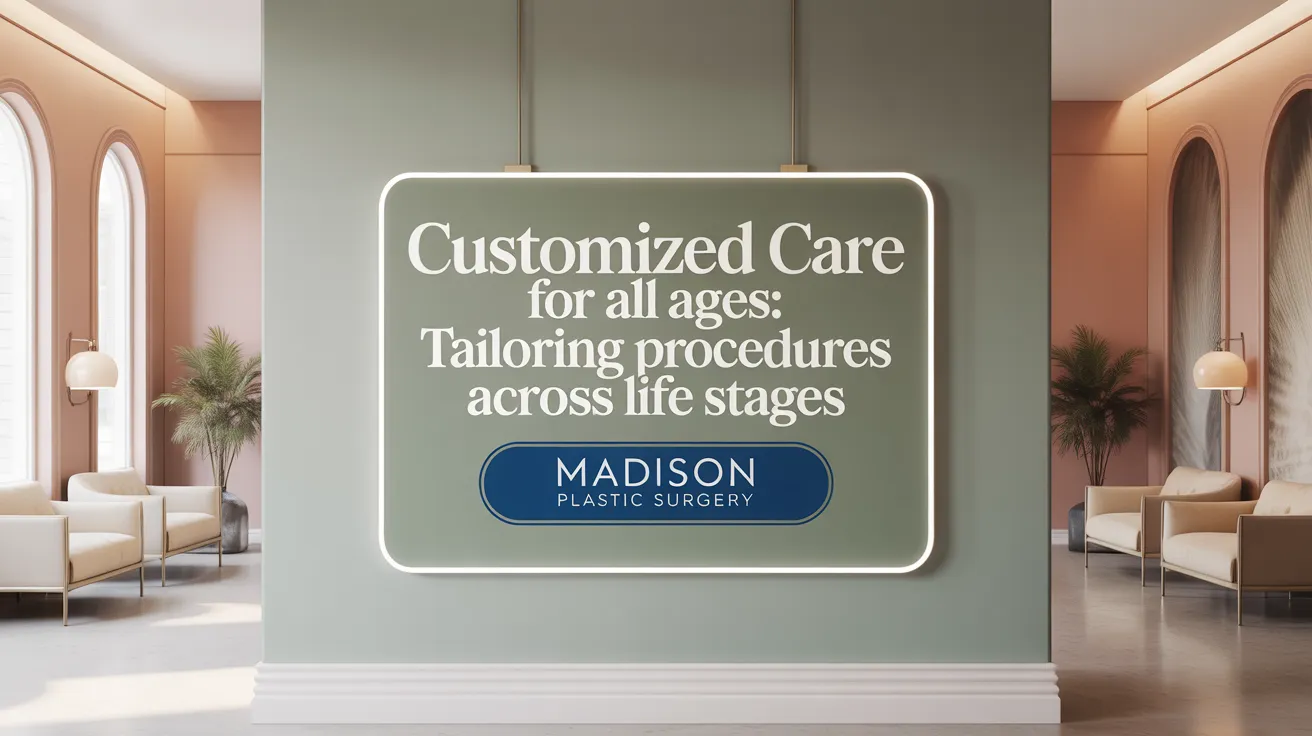Setting a New Standard in Patient-Centered Plastic Surgery
In the evolving landscape of plastic surgery, the emphasis is shifting towards tailored treatments and enriched patient experiences. Madison's plastic surgery practices, led by esteemed surgeons like Dr. Clifford King, exemplify this transition by combining advanced surgical expertise with a compassionate, patient-focused approach. This narrative explores how personalized care plans, surgeon-patient communication, and age-appropriate treatments come together to deliver exceptional results and high patient satisfaction in Madison.
Expertise and Personalized Treatment at Madison's Plastic Surgery Practice

What qualifications and training does Dr. Clifford King have?
Dr. Clifford King is a highly qualified board-certified plastic surgeon in Madison. He holds both M.D. and Ph.D. degrees from Georgetown University, reflecting a strong foundation in medical knowledge and research. His extensive training includes general surgery, plastic surgery, hand surgery, and microvascular surgery. He is board-certified by the American Society of Plastic and Reconstructive Surgeons and has been recognized as one of the best doctors in Madison by Madison Magazine continuously since 2003.
What types of cosmetic procedures are offered at Dr. King's practice?
Dr. King's practice offers a comprehensive array of cosmetic procedures offered tailored to patient needs. Surgical options include facelift surgery, brow lift procedure, rhinoplasty, eyelid surgery, breast augmentation, breast lift surgery and breast reduction, liposuction services, and tummy tuck. Additionally, the practice provides non-surgical treatments such as Botox treatments and Restylane injections for facial rejuvenation and skin care. This wide-ranging suite of services allows for customized approaches to enhance both facial and body aesthetics.
How does the practice ensure personalized care?
Personalized treatment is central to Dr. King's approach. The practice crafts individualized customized facial and body treatment plans that address unique goals for facial and body enhancement, including post-weight loss treatments and skin care treatments. A friendly, low-pressure plastic surgery environment encourages patients to ask questions and be fully informed throughout the process. This open communication fosters trust and ensures patients understand their options, making the decision process collaborative and tailored to their preferences.
Dr. King's blend of expert training, extensive procedural offerings, and dedication to patient education and questions creates an outstanding experience that prioritizes each patient's specific desires and well-being.
The Importance of Surgeon-Patient Communication in Patient Satisfaction

What surgeon-related factors most influence patient satisfaction?
Patient satisfaction in plastic surgery is strongly linked to how well the surgeon communicates with their patients. The surgeon's ability to answer questions thoroughly is crucial, as it helps patients feel informed and confident in their care. According to a study of 37,000 plastic surgery patients, involving patients directly in the decision-making process plays a major role in satisfaction. When patients participate actively, they tend to have better satisfaction because their individual needs and concerns are respected and addressed.
Showing genuine concern for patient worries and providing clear explanations about their condition and treatment options are essential components of successful communication. These practices increase patients' trust in their surgeon and the treatment process. This aligns with the importance of surgeon empathy and explanations highlighted in patient-centric care approaches.
Impact of communication on recommendations
Clear, empathetic communication doesn't just enhance satisfaction; it also increases the likelihood that patients will recommend their surgeon and practice to others. Confidence in the surgeon, fostered through respectful dialogue and attentive care, builds positive reputations that benefit both patients and practitioners alike. This is especially evident in environments like those led by Dr. Clifford King, board-certified plastic surgeon in Madison, where patient-focused and friendly care is prioritized.
Overall, surgeons who focus on strong communication and patient involvement create a positive experience that contributes significantly to patient happiness and surgical success. This approach reflects principles of the patient-centric approach in plastic surgery and is key to maintaining high standards in plastic surgery practices.
Tailoring Plastic Surgery Procedures Across Different Age Groups

How are plastic surgery procedures tailored to different age groups?
Plastic surgery procedures are carefully adapted to meet the needs and maturity levels of different age groups. Younger patients, typically between 13 and 19 years old, generally receive minimally invasive procedures for youth. Surgical options like breast augmentation age requirements are reserved for those aged 18 and older to ensure physical and psychological readiness.
Patients in their 40s and 50s often pursue more subtle enhancements or restoration surgeries that focus on rejuvenating natural features rather than dramatic changes. This approach reflects both aesthetic goals and health status common to this age group (plastic surgery trends in 40s and 50s).
Managing patient expectations and psychological maturity
A key aspect of age-specific care is managing expectations through thorough preoperative consultations for plastic surgery. Surgeons work closely with patients to set realistic goals and ensure that individuals fully understand the potential outcomes and risks involved.
Psychological maturity and informed consent in plastic surgery are especially emphasized for younger patients. Surgeons assess readiness to make major decisions and ensure that patients, along with their families when appropriate, are fully informed before proceeding.
Safety considerations across ages
Safety protocols vary based on age and health. Among younger individuals, psychological and developmental factors are primary considerations. For older patients, overall health assessments before plastic surgery guide surgical planning to minimize risks and complications.
Role of board-certified plastic surgeons
The Plastic Surgery guidance by ASPS strongly recommends that patients seek board-certified plastic surgeons. These specialists have the training and expertise to tailor procedures appropriately for different age groups, ensuring patient safety, satisfaction, and optimal results.
By focusing on personalized care that respects age-related factors, surgeons help patients achieve aesthetic goals with confidence and safety. For example, Dr. Clifford King, M.D., Ph.D., a board-certified plastic surgeon in Madison offers customized facial and body treatment plans designed to meet the unique needs of each patient across different life stages.
Patient Regret and Satisfaction Trends in Plastic Surgery

What are the known rates of patient regret after plastic surgery?
Patient regret rates after plastic surgery vary significantly depending on the type of procedure. Breast reconstruction shows the highest regret rate, reaching up to 47.1%. In contrast, breast augmentation sees regret rates between 5.1% and 9.1%, while body contouring procedures have rates ranging from about 10.82% to 33.3%. Gender-affirming surgery stands out with a notably low regret rate of approximately 1%, indicating high satisfaction among this group. For more details, see the patient regret rates in plastic surgery study.
How does regret after plastic surgery compare with other surgeries and life decisions?
When compared to other major surgeries, plastic surgery tends to have lower regret rates. For example, regret following prostatectomy can be around 30%, and bariatric surgery patients report regret rates up to 19.5%. In broader life choices, about 7% of people regret having children and 16.2% regret getting tattoos. This comparison suggests that many plastic surgery patients experience less regret than those undergoing other medical procedures or making significant life decisions. More comparisons are detailed in the patient regret after surgery review.
What are the implications for patient education and care?
Understanding varying regret rates highlights the importance of thorough patient education and personalized care. Surgeons who engage patients in detailed discussions about treatment options and realistic outcomes can potentially reduce regret. Encouraging questions and building patient confidence are essential in fostering satisfaction post-surgery. Learn more about enhancing satisfaction through patient satisfaction with plastic surgery: it’s the surgeon, not the practice and the Three C's of patient-centric care.
Why do gender-affirming surgeries have high satisfaction rates?
The remarkably low regret rate after gender-affirming surgery, at just about 1%, reflects the profound positive impact these procedures have on patients’ well-being. This underscores the significance of tailored care and psychological readiness, contributing to overall patient contentment with surgical outcomes. For specialized plastic surgery guidance including care for all ages, see resources on plastic surgery at all ages: tailoring procedures to different life stages.
The Practice Philosophy: Compassionate Care and Community Focus in Madison

What is the practice philosophy at Dr. King's Madison clinic?
Dr. Clifford King, M.D., Ph.D., board-certified plastic surgeon in Madison is rooted in a patient-centric approach in plastic surgery that prioritizes compassionate care. Patients experience a friendly, low-pressure plastic surgery environment tailored to their unique needs. This philosophy emphasizes full patient education, encouraging open communication and questions to ensure individuals feel confident and well-informed about their treatment options.
Practice Philosophy and Patient Centricity
The clinic develops customized facial and body treatment plans that integrate facial procedures, body procedures, alongside skin care treatments and post-weight loss treatments. Dr. King’s extensive training and ongoing commitment to staying abreast of the latest surgical techniques underscore the high professional standards in plastic surgery maintained at the practice.
Local Community Engagement
Serving the Madison community, Dr. King's practice focuses on building lasting relationships with patients by delivering care that reflects the community’s values and aesthetic preferences. Patients benefit from a localized approach, making advanced plastic surgery accessible and approachable within their own region.
Recognition and Reputation
Dr. King has been recognized repeatedly by Madison Magazine as one of the best doctors in the area since 2003. This consistent local acclaim speaks to the deep trust and respect earned through years of dedicated service, reflecting the quality and reliability of the practice.
Creating a Supportive Environment
Beyond surgical skill, the practice prioritizes creating a supportive atmosphere where patients never feel pressured. Comprehensive education and open dialogue empower patients, fostering confidence and satisfaction through every step of their cosmetic journey, aligned with the patient-centric approach in plastic surgery.
A Model of Personalized Plastic Surgery Care in Madison
Madison's plastic surgery landscape is defined by a dedicated focus on individualized patient care, highlighted by experienced surgeons like Dr. Clifford King who blend technical excellence with empathetic communication. By emphasizing thorough consultations, tailored procedures across all ages, and fostering open patient communication, the practice promotes high satisfaction and low regret rates. This comprehensive patient-centered approach not only elevates cosmetic outcomes but also ensures that patients feel supported, informed, and confident throughout their transformative journey.
